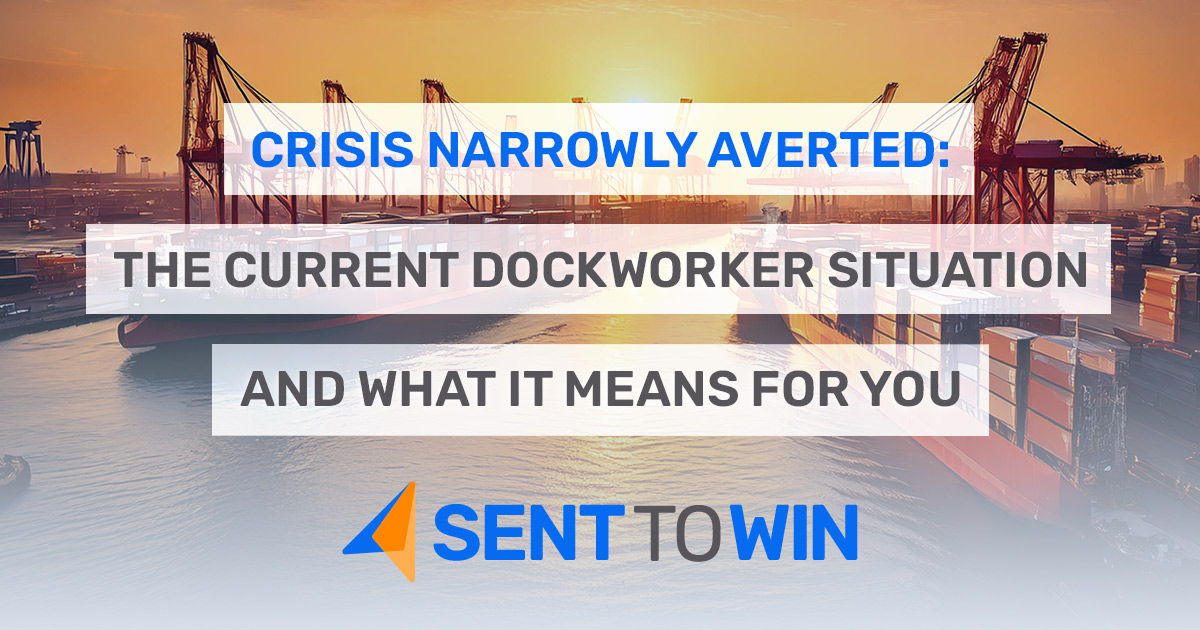Crisis Narrowly Averted: The Current Dockworker Situation and What It Means for You
In today’s newsletter:
- Crisis Narrowly Averted: The Current Dockworker Situation and What It Means for You
- Rebuilding Asheville, Market Watch, and No Peace in the Middle East
- Premier Christian Communications – The Success Story You’ve Never Heard of
Imagine someone is eating at a restaurant that receives a bomb threat. For some reason, the restaurant cannot be evacuated, and most of the people eating don’t even know that a bomb has been located on the premises. They continue their meals blissfully unaware. Experts slip in, diffuse the bomb with just moments to spare, and the restaurant has no idea how close they came to tragedy.
Metaphorically speaking, this is what just happened to the American economy.
On October 1st, the International Longshoremen’s Association (ILA) began a massive strike the scale of which we haven’t seen in 50 years, affecting the entire Eastern Seaboard and the Gulf of Mexico. The Longshoremen are the workers who work the docks, ensuring that imports and exports can get in and out and on the road.
Nearly 50,000 members walked out, demanding a wild pay increase on top of their already lucrative compensation and banning the most effective machine and automation technology from being implemented in our ports.
The ports affected handle nearly half of all U.S. imports and exports, and President Biden said repeatedly during the lead-up to this showdown that he would not interfere in negotiations or use the Taft-Hartley Act to keep the ports open during negotiations.
“It’s collective bargaining,” Biden said. “I don’t believe in Taft-Hartley.”
The Taft-Hartley Act is a national security measure that allows the President to keep vital infrastructure operating for 80 days even during labor disputes, so that the nation does not suffer the terrible consequences of a union walkout on our most important systems. Biden wasn’t willing to invoke it.
So, with essentially nothing to lose, the ILA went to the negotiating table.
The previous contract, which just expired, started dockworkers out at $20/hour for brand-new, unskilled recruits. By their sixth year of work, these longshoremen were earning $39/hour. For the new contract, the USMX offered a nearly 50% pay increase, a tripling of employer contributions to retirement plans, and improved health care.
The union rejected this offer.
Harold Daggett, president and chief negotiator for the ILA, had this to say to the American people:
“I will cripple you. Everything in the United States comes on a ship.”
Daggett earned a combined salary of over $900,000 last year and has raised eyebrows for his luxury yachts and vehicles.
So what was the dockworker’s union demanding?
A 77% pay increase and a contractual ban on all automation on U.S. ports for all time.
U.S. port efficiency is famously bad when compared to other nation’s ports. In recent rankings, not a single U.S. port made it into the top 50, and only a handful made the top 100 at all – mostly very close to the end of the list.
Many experts have written that the reason for the United States’ severely lacking performance at the ports is due to union contracts, which do not allow many ports to operate at all hours and already severely restrict automation, while the rest of the world uses automation to keep the ports running at all times.
The ILA has also been criticized for choosing to strike in the immediate aftermath of the devastating hurricane that decimated Western North Carolina.
“I’m rabidly pro-union,” says one commentator on X (formerly Twitter) “but Mother Jones would be appalled at the way dockworkers are playing games with the U.S. economy. And I say this as a guy who literally drags his family to her grave every year as we drive up to visit family in Chicago.”
“If prices go up now when we need stuff the most in NC,” says one North Carolina pastor, “I swear I’m becoming rabidly anti-union in ways I would not have anticipated. And I have not been that guy. But not now.”
When the strike first began, Sent to Win asked a top executive in the maritime industry how worried we should be about this. His response was:
“Very worried. The interruption to supply chains can be catastrophic, reminiscent of COVID days.”
He then added that more than 90% of goods in the U.S. arrive via ports.
Experts warned that this strike would cost the economy roughly $5 billion per day, could threaten jobs, and could increase inflation.
In other words, GDP goes down, prices go up, and availability goes down.
ILA president Harold Daggett had this to say, describing what he foresees as the consequences of his strike.
“First week, it will be all over the news… Second week, guys who sell cars can’t sell cars because the cars ain’t [sic] coming in off the ships. They get laid off. Third week, malls start closing down. They can’t get the goods from China. They can’t sell clothes. They can’t do this. Everything in the United States comes on a ship. They go out of business. Construction workers get laid off because the materials aren’t coming. The steel is. The lumber is not coming in. They lose their jobs. Everyone is hating the longshoremen now because they realize how important our jobs are now.”
He was not exaggerating.
Experts have called the potential of this strike “devastating,” and the consequences could have affected the global economy.
The good news is, that the strike only lasted three days (and the three-day strike will require at least three weeks to catch up at the ports, according to Everstream Analytics). So what happened? How was the “bomb” diffused?
What Happened to Stop the Strike?
Essentially, Florida Governor Ron DeSantis stepped in.
“I would say that this [strike] is something that would have significant impacts on the nation’s economy anyways,” he said, “but to have this happen in a way that could negatively impact people who are reeling from a category 4 hurricane – that is just simply unacceptable.”
DeSantis deployed the National Guard to work the ports, set up expedited transportation corridors in cooperation with Florida Highway Patrol, and waived toll fees and size and weight restrictions on trucks traveling from Florida ports.
Other states noticed. Their own governors would have been under pressure to do the same, and if Florida’s port efficiency managed to stabilize or (if this hypothetical gets really crazy) if port efficiency improved while the ILA was on strike, that would have dramatically reduced the union’s bargaining powers.
So the strike was called off until at least January, and the USMX and the ILA have a tentative agreement for a pay increase in surplus of 60%, and they have extended the Master Contract another few months.
For the moment, the sudden crisis is averted.
The winners are most certainly the ILA, which has managed large concessions from the USMX after striking for only a few days. The governor of Florida comes out looking well, for stopping the immediate threat of shortages, inflation, and economic chaos.
The losers, however, might just be the American people, who, despite belonging to the richest nation in the history of the world, will continue to endure higher prices and a slower speed of business, because our ports are in many ways an international embarrassment, purposely held back from using modern technology and closed during many workable hours of the day. (China’s ports, for example, regularly process more than 4 times as much cargo per hour as typical U.S. ports.)
In other words, we managed to hit the snooze alarm for now, but the problem of U.S. ports will continue to catch up to us until we finally embrace innovation and ignore the Harold Daggetts of the world.
Harold will be fine. He has a 7,000 sq. ft. mansion in New York. But come January, we may see fresh trouble as language regarding the use of automation at our ports once again comes into question. As union dockworkers continue to demand higher and higher pay, automation becomes increasingly attractive to port authorities, but interests are now so entrenched that a big shift in operations might mean a big disruption to our economy.
TL;DR
Things are back to essentially status quo for the moment, but be prepared – January 15th could mean another massive strike. When the New Year comes, your business may want to be sure it has the supplies that it needs, and that it does not have an overabundance of debt.
INDUSTRY INSIGHTS
Rebuilding Asheville, Market Watch, and No Peace in the Middle East
Rebuilding Asheville
Hurricane Helene recently tore through western North Carolina, and the aftermath is heartbreaking. Entire towns have been washed off the map, and Asheville was left virtually inaccessible except via air. The water system was damaged badly, though restoration has now begun – albeit without a real timeline as of last week. Much of the rest of the work is being done by volunteers and Samaritan’s Purse has been on the scene in Watauga County, coordinating volunteers and providing much-needed resources to a shell-shocked, endangered community. The Red Cross is helping as well, and, contrary to some online narratives being spread, FEMA and other government agencies are providing relief as well. Asheville was an up-and-coming economic powerhouse, but having experienced “biblical devastation,” its future remains unclear. If you’d like to see a list of ways you can help the unfortunate people of Asheville and its surrounding areas during this crisis, click here.
Market Watch
The Chinese Market suddenly fell off of its rally this week, as the stimulus has not met investor expectations. Meanwhile, US stocks continue pushing to new heights – particularly the S&P 500 which reached a new record Wednesday. Bayer’s shares fell sharply this week as the Washington Supreme Court says it will review a case brought against Monsanto’s alleged use of harmful PCB chemicals in their products. Gold has slipped slightly from its recent record highs, and oil is also slightly down as of Wednesday (though still up since the turmoil in the Middle East). In regional news, the State of Florida is bracing for the imminent impact of Hurricane Milton, with over $20 billion in damage projected.
No Peace in the Middle East
After months of escalating tensions in and around Israel, the war has now officially widened. Previously between only Israel and Hamas, Hezbollah began attacking Israel more and more, forcing Israel to respond. Now, Israel is on the ground and moving into Lebanon, and with Iran recently attacking Israel directly, conflict is sure to ramp up. What does this mean economically? For one thing, it probably means increased defense spending. With Russia and Ukraine still going at it, Israel now toe to toe with Iran, and China very willing to invade Taiwan, the U.S. needs to be ready to fight on several fronts if we end up getting dragged into a war. Oil prices have risen due to the Israel-Iran conflict, naturally, and we expect to see higher gas prices in the U.S., which compound existing supply chain difficulties caused by the dockworkers’ strike, so we could see some price increases in goods as well.
Sunday School
Q. Which one of the 12 sons of Israel had his name changed?
A. Benjamin. When his mother, Rachel, was giving birth to him, she was dying and in great anguish. She named him “Benoni,” which means “son of my sorrow.” Jacob, however, said that he would instead call him “Benjamin,” or “son of my right hand.”

“Hello and welcome back to London’s Christian Radio Station! The government has only allowed us to say that Jesus might be the way, so I’m going to need you to fill in some of the blanks for yourself today…”
TIPS & TRICKS
Premier Christian Communications – The Success Story You’ve Never Heard of
Lively, honest discussions of differing ideas in good faith are pretty hard to find these days. Social media can be quite an echo chamber, and as our politics and even our churches seem to be further apart than they have been in a long time, one Christian media company is seeking to change all that:
Premier Christian Communications.
If you’ve never heard of them, you’re not alone. They’re primarily a European company, though their influence has spread across the pond now as well.
Premier was founded as a radio station in the United Kingdom in 1994, and it also offered a call-in counseling service called Premier Lifeline to people who needed someone to talk to or ask for advice. After only a handful of years, they expanded into magazines, producing such titles as Premier Christianity, Premier Youth and Children’s Work, and Premier Women Alive.
Premier’s radio programs were, at one time in the mid-2010s, reaching nearly a quarter of a million people per week, with the average listener tuning in for over 10 hours a week. That’s pretty good brand engagement and reach, especially in a country like the UK, where Christian beliefs and teachings are sometimes persecuted by the government. In 2001, for example, they received a “yellow card” from the government for broadcasting content that was “offensive to people of other, non-Christian beliefs.”
They had to make some adjustments just to keep operating.
Nevertheless, even in a somewhat adversarial environment, Premier has become the dominant Christian media company in the UK, playing praise and worship music, broadcasting gospel presentations, reporting, writing, and hosting lively debates.
Where else, other than Justin Brierley’s Premier Christian Radio show “Unbelievable?” can you hear two accomplished scientists (one Christian, one explicitly anti-Christian) debating respectfully, or a Messianic Jew and a progressive Jewish rabbi debating the divinity of Christ, or to have a Christian and a non-Christian debate on the internal consistency of Christian beliefs?
Brierley is a great moderator, and he doesn’t shy from controversial topics whatsoever, but it is refreshing to hear real discussions happening with civility and grace.
There is plenty to be gleaned from the example and ministry of Premier Christian Communications, but to us, one thing stands out as most important:
It is possible to succeed in an adversarial environment.
Don’t misunderstand and take this as advice to take a lot of longshots in your business and to flout the market conditions when you begin. However, Premier’s example shows that even in a difficult space, with regulators breathing down your neck, with a shrinking target audience, and a shifting cultural landscape, you can still be faithful to your convictions, operate to the best of your abilities by the grace of God, and maybe even do quite well, if you’re lucky.
London isn’t a terribly Christian city anymore. But maybe Premier will help to change that someday.
Quick Hits
- Christian Contemporary Music is now one of the fastest-growing genres in the music industry.
- Money in politics? Appeals court rules that citizens can once more gamble on the result of U.S. elections.
- Costco now sells platinum bars to members who would like to invest in precious metals.
- Christians rally to help Hurricane Helene victims in Florida and North Carolina.
- Could volatile Bitcoin price hit a new high this week? Some experts say yes.
- Remember these? Relevant has put together a list of the top 10 somewhat cringy Christian products of the 80s and 90s.
For Kingdom Leaders, By Kingdom Leaders
Bringing Kingdom-minded leaders like you fresh perspectives and insights on business, finance, and leadership trends.








